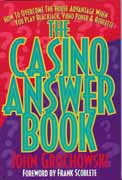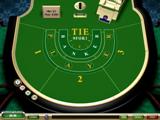
Casino Answer Book
Baccarat versus Chemin de Fer Explained
 John Grochowski is the author of six gaming books including the "Answer Book" series -- The Casino Answer Book, The Video Poker Answer Book, The Craps Answer Book and a revised edition of The Slot Machine Answer Book. His articles cover blackjack, slots and video poker strategy as well as casino etiquette and getting the most bang for your buck in Vegas. John's website is www.casinoanswerman.com hit/stand decisions to make. Draws are made according to set rules, posted on the table. Your only decision is choosing your wager.
John Grochowski is the author of six gaming books including the "Answer Book" series -- The Casino Answer Book, The Video Poker Answer Book, The Craps Answer Book and a revised edition of The Slot Machine Answer Book. His articles cover blackjack, slots and video poker strategy as well as casino etiquette and getting the most bang for your buck in Vegas. John's website is www.casinoanswerman.com hit/stand decisions to make. Draws are made according to set rules, posted on the table. Your only decision is choosing your wager.
That prompted a call recently from a man who introduced himself as Rich. He'd been to Monte Carlo, and decided to play baccarat. He felt as if he were stepping into an alternative universe.
"It may still have been a good bet, but it wasn't quite a no-brainer," said Rich, who said had played baccarat often in Las Vegas. "Players WERE making decisions. They weren't hard decisions, and mostly they were the same as if they were following the rules here, but still, there were choices to make."
I asked if a player was banking the game --- were players betting against another player, rather than against the house?
"That's exactly what was happening," he said. "The house was getting its edge by taking a commission."
The baccarat game he had found, I told him, was chemin de fer. In the United States, you might see a chemin de fer table from time to time, but nearly all American baccarat is the version called punto banco.
Just as in punto banco, chemin de fer is played with two two-card hands, banker and player. Aces through 9s are counted as their face value, while 10s and face cards are counted as zero. When cards are totaled, only the last digit counts --- a 9 and a 4 isn't 13, it's 3. Highest total wins, with 9 being a perfect hand.
Chemin de fer as played in high-limit salons can be a tradition-laden game, with ceremony that goes right down to shuffling of the cards. Usually, six decks are used. After the croupier shuffles, the cards are passed around the table, with each player having the right to shuffle again before the croupier gives the cards a final shuffle.
In chemin de fer, a player then has the right to act as banker --- a twist you'll sometimes find in American high limit games, but which you'll certainly never find at your local mini-bac table. The croupier gives a portion of the cards to the player/banker, who then places in front of him the amount of money he is willing to risk --- the bank. He then acts as dealer and the other players --- or "punters" --- bet against his bank.
After players make their bets against the bank, the banker deals a two-card player hand and a two-card dealer hand, both face down, and slides the player hand to the punter making the highest wager. If either the banker or player has an 8 or a 9, that ends the hand. Cards are flipped up, and wagers are settled.
If neither banker or player have 8 or 9, the player then makes a decision on whether to take a third card, dealt face up. The decision is almost always automatic. With 6 or 7, he must refuse a third card, and with 0, 1, 2, 3 and 4 he must take one. Oh, some casinos allow contrary plays, but with the money of other punters on the line ... well, it just isn't done.
Only with a point of 5 is there a true option. The player can take a third card or not, at his own discretion. The best play is to take a third card when starting 5.
After the player has accepted or declined a third card, it's the banker's turn. If the player has declined a third card, the banker knows the player has at least 5, and probably 6 or 7. In that case, the dealer with a low total knows he had better take a card. If the player has taken a third card, the banker knows the starting hand was no higher than 5, and he also has seen the player's third card. All that bears on the dealer's decision. If the player's third card is a zero-value, for example --- and 30.8 percent of the cards are zeroes --- then the banker knows the total is still 5 or less.
That the player's "decision" can influence whether the banker takes a third card is similar to the situation in good old baccarat punto banco. In our American version, a banker hand of 7 stands pat; 6 gets another card if the player's third card is 6 or 7; 5 gets a card if the player draws 4-5-6-7; 4 gets a card if player draws 2-3-4-5-6-7; 3 gets a card if the player draws anything but 8, and the bank always draws to 0, 1 or 2. If you find yourself acting as the bank in chemin de fer, that's a good guideline to follow.
I explained all that to Rich, with a few shortcuts. He seemed happy.
"That's all more similar to our baccarat than it seemed," he said. "Maybe not the same no-brainer ... but close enough."
Listen to John Grochowski's "Beat the Odds" tips Saturdays at 6:20 a.m., 2:50 p.m. and 7:41 p.m. and Sundays at 8:20 a.m., 2:50 p.m. and 10:42 p.m. on WBBM-AM, News Radio 780 in Chicago, streaming online at www.wbbm780.com, and to his casino talk show from 7 to 8 p.m. Saturday on WCKG-FM (105.9)

